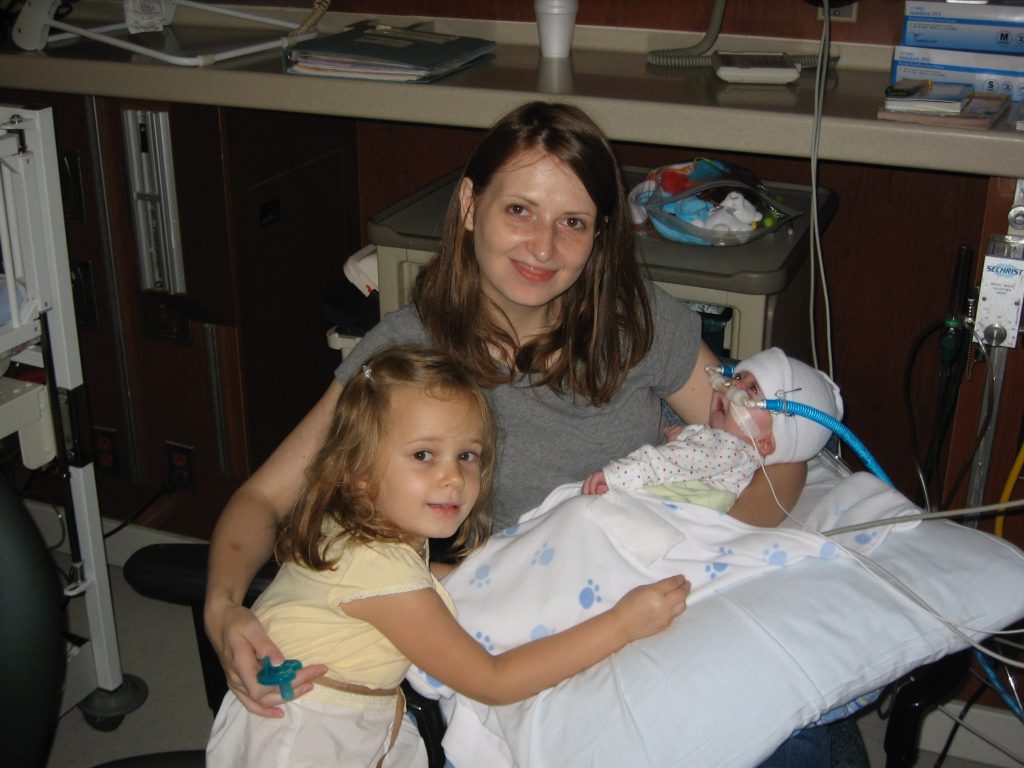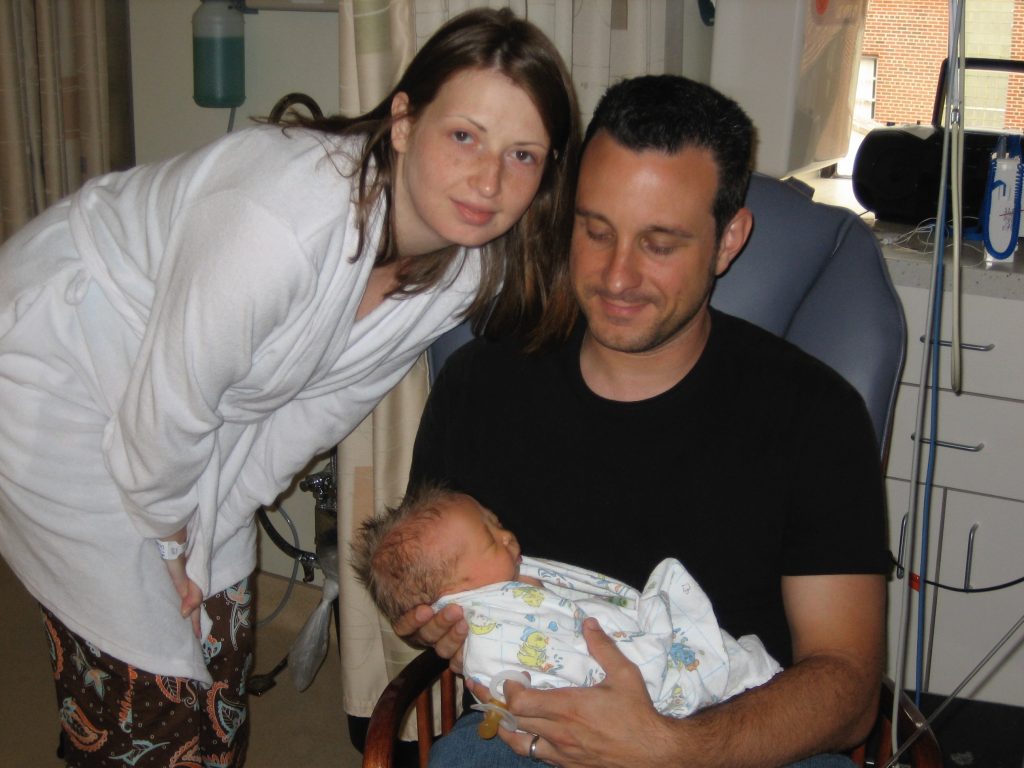This is a contributor post by Anna Visioli, VP of Operations for Coldwell Banker Real Estate LLC
I believe it’s important for women to hear how taking on the roles of caregiver and leader made me better in both. And how, far from having to hide my experience as caregiver for fear of seeming like a less than dedicated employee, my company gave me the space I needed and earned a loyal employee in the process. I’m the VP Operations for Coldwell Banker Real Estate and have been with the company for almost 13 years, I live about 15 miles from the office with my husband, Kevin, my 11-year-old-son, Dylan, (who still likes me on most days), and my 16-year-old daughter, Emma, who I affectionately refer to as “Genetic Karma.”
My personal experiences have taught me important lessons that are also applicable to my career and have made me a better leader, employee and mom.

Life Lesson #1, while I encourage everyone to aggressively pursue their goals: be it work, family, or higher education, attempting to do it all at once is a terrible idea. My advice: Do not attempt this.
Typically, when we write a resume or share our relevant work experiences, the focus is on the jobs we’ve had, but I think of my timeline as three parallel lines: work, education and family – since those three are inexorably linked and have such significant overflow with each other. And for me these three areas hit a significant point of impact in late 2001 and early 2002 when I was working full time (for Thompson Financial as a municipal bond research analyst), going to get my MBA at night (at nearby Rutgers University) and being very pregnant/having a newborn (see my now 16-year-old, referenced above).
About a year later I was still working, still MBA-ing, kid still in tow, when I was let go as part of a massive lay-off. What my Type-A self initially saw as a failure ended up being one of the best things that ever happened to me.
Life Lesson #2, sometimes your biggest opportunities are disguised as setbacks and you need a swift kick in the butt to push you in the right direction.
Temporary unemployment was a gift that allowed me to finish my MBA and pursue a career more in-line with my interests. While financial research left me with a deep understanding of data and finance, it didn’t inspire or excite me. So I started working for a very small marketing consulting firm – six people small.
In the end that job wasn’t for me but it did provide me with hands-on experience that set me up for my next role – Interactive Marketing Manager at Coldwell Banker. About three months into the job, I found out I was pregnant with kid #2.
Things were finally falling into place.
Life Lesson #3: Sometimes, despite your best efforts, things don’t work out the way that you intended.
After a very uneventful pregnancy, my son was born. Immediately I knew something was wrong. They placed him next to me for a second, then quickly whisked him away, and he looked a little blue. And there was a larger crowd of doctors than was necessary.
He was born with a number of issues, ‘congenital anomalies’ I was later told: low muscle tone, club feet, most concerningly, a condition called Pierre Robin where an underdeveloped jaw caused his tongue to fall back into his airway. He was unable to breathe without oxygen support and despite our best efforts, unable to eat by mouth.
Two days later, we were transferred to the NICU at Morristown Memorial Hospital (right around the corner from the Coldwell Banker Madison Home Office) because the local community hospital where he was born couldn’t handle his issues.
Our lives were shattered, I had done everything right. Gained the perfect amount of weight. Exercised a little, but not too much. All my tests results had been right where they needed to be. This was a complete shock to my system.
Initially, we were told he just needed to get a little stronger, he’d start breathing on his own, he’d start eating on his own. We spent over four months at the NICU. He confounded every doctor and specialist. While they had seen his individual issues together, they had never seen these issues all at once, in one tiny human being.
And they continued to find other things: congenital lobar empyema that required the removal of half of his lung. To help his breathing, they did a tongue lip adhesion (which is exactly what it sounds like) which required him to be in a medical coma for five days while the adhesion healed. Spoiler alert: the surgery did nothing to help his breathing.
These were probably the toughest months of my life. He stopped breathing and needed to be resuscitated more times than I care to remember. But through it all I continued to work.
Life Lesson #4: Everyone is going to have a time when life eclipses work and your employees need the flexibility to get through whatever is going on.
I continued to work, more or less full-time, when he was in the hospital. Mentally, I found that working was good for me and my goal was to take time off when Dylan finally came home. My boss at the time was great and allowed me to work a flexible schedule so I could be at the hospital when I needed.
In my case, the empathy was expected. I was a woman with a newborn with health issues. It’s easy to empathize with that. But what about men in a similar situation? Or a child caring for an older parent? Or someone dealing with an ailing sibling? It’s really underlined the huge importance of allowing the people we work with the flexibility to manage whatever personal crises arise. Because if we support people when the chips are down, that will always be remembered.
Women often take on most of the burden in caregiving situations. And it’s critical that we don’t overlook our male employees. We need to allow the same flexibility for men to help alleviate the burden of their wives or same-sex spouses. I was only able to work because my husband spent just as much time in the hospital as I did. Part of creating workplaces that support women requires allowing fathers similar flexibility that we allow mothers – and making it acceptable for them to take advantage of that flexibility.
Life Lesson #5: Prioritizing is hard to do, in work and in life, but you can’t be everywhere at once, and it’s critical to focus on the people and things where you can make the most impact.
That time in the hospital wasn’t easy, especially with a healthy, happy but still emotionally needy 4-year-old at home. My instinct was, as I think most people’s is, is to focus all my energy on my sick newborn. But Dylan had no idea what was going on, and Emma did—and she needed us. So, for her, we needed to maintain some level of normalcy. We went to amusement parks and out to dinner and scheduled playdates. And it was hard.
Dylan finally came home in November of 2016, but our medical rollercoaster ride didn’t end there. He went back into the hospital after just a month of being home to have a tracheotomy tube put in. He still wasn’t eating, so a “mickey button” was permanently installed in his abdomen so he could be tube fed. His hip dysplasia didn’t resolve, so an osteotomy was performed that involved cutting his hips and casting both his legs. In an attempt to extend his chin, he had a jaw distraction.
Life Lesson #6: I quickly learned that it’s pretty amazing the things you’re able to accomplish when failure is not an option.
It’s a mantra that I’ve tried to extend to the rest of my life.
Now mind you, I am a squeamish person. I still can’t donate blood because I pass out. After the jaw distraction, Kevin and I had to turn Frankenstein-like screws that protruded from below Dylan’s ears two times a day to manually push his jaw out. The trach had to be changed once a week. The interesting thing that most people don’t know is that a hole in the neck can close up in seconds, so changing a trach requires quickly pulling out one tube and reinserting another before the hole closes up. If you hesitate, your child’s only viable airway can close right in front of you.
Lesson #7: Stop feeling sorry for yourself and realize how lucky you are.
As we went through all of this, there were a lot of long, arduous stays in hospitals. But it was here that we realized that lucky we were. When Dylan was recovering from his tracheotomy surgery, he had to stay at Children’s Specialized, a local hospital here in New Jersey, to recover. It’s a good 45 minutes from our house, and it was frustrating to have him so far away. Until, through broken English, the couple next to us shared how they took three buses for over two hours to see their son, who had been in that hospital bed for nine months.
We had insurance, and transportation and a supportive family. We had the resources to get through this. Others were not nearly as lucky.
Life Lesson #8: Find (and use) your voice.
One of Dylan’s toughest surgeries was for his early onset kyphosis and scoliosis at the age of 4. He had a bar placed in his back that would be surgically extended every six months. And until he had adequate bone growth to support the newly inserted bar, he was put in a pin less halo for six weeks.
Almost immediately, we knew something was wrong. The halo looked crooked, Dylan seemed to be in a lot of pain. We were assured by the various residents and post-doctorate students that his doctor, who was the head of orthopedics at the Children’s Hospital of Philadelphia (I mean, he was world-renowned, he was THE guy for this type of surgery) knew what he was doing. When we complained about the pain, our doctor told us that was to be expected.
About four weeks after his surgery, I was sitting with him on my lap, attempting to console him, and noticed crusting around the halo on his head. I immediately knew something was wrong, and called his doctor, who wasn’t available, and the doctor who was covering for him, and was told he was in surgery and also unavailable.
So I put my kid in the car, and drove the two hours down to Philadelphia.
In the end, they discovered he had two ulcers, about two inches in diameter on the sides of his head, that opened onto his skull.
As women, we sometimes have difficulty finding our voice, standing up to authority, and going with our gut. Trust me, after that experience, I’ve learned to never, ever question my inner voice.
Life Lesson #9: Optimism and a positive attitude can overcome just about anything. My son taught me this one personally.
When Dylan first came home from the hospital at five months he couldn’t hold his head up or eat by mouth. Doctors and therapists told us his ‘functionality would be limited,’ whatever that meant.
And he did spend the majority of his early years in therapy.
He first sat at 12 months, walked at 18. He finally began eating by mouth when he was three, and began speaking that same year when his trach was finally taken out.
But, a few months later, something pretty amazing happened. We were all having breakfast one Saturday morning, it was August, just a few weeks after his fourth birthday, and he started reading the back of a cereal box.
In the 7 years since, he’s certainly made up for lost time. He is now in 6th grade and his reading level is the same as a high-school junior. Even though we were warned about food aversions because of his inability to eat early on, he’ll try anything, and raw mussels and oysters rank among his favorite foods.
Even though he’s half the size of the kids in his class (he’s on growth hormones for that), he still has those rods in his back that protrude a little bit, and the Pierre Robin that he was born with left him with a squeaky voice, he’s one of the most outgoing, happy kids you’ve ever met.
He’s been playing drums for five years (and he performs in a rock band with other kids), he is starring in his middle school play, and writes and directs a seemingly endless stream of movies with plotlines heavily inspired by Star Wars.
Life Lesson #10: Share your story
So why is my story important? Because our lives outside of work inform who we are as employees. Which is why nurturing a diverse employee population is so critical. Because I firmly believed people that lead full, whole lives—whatever that life looks like to them—make the best employees.
At Coldwell Banker, we want to address the significant disparity between the proportion of women agent versus women in management and brokerage positions within our affiliated companies. As we work to narrow that divide, it’s critically important that we not only allow—but encourage our agents, brokers, and home office employees to share their own stories.
So, what’s yours?
To find out more about how Coldwell Banker can be the place that supports you and your business, visit CBWomen.com.






